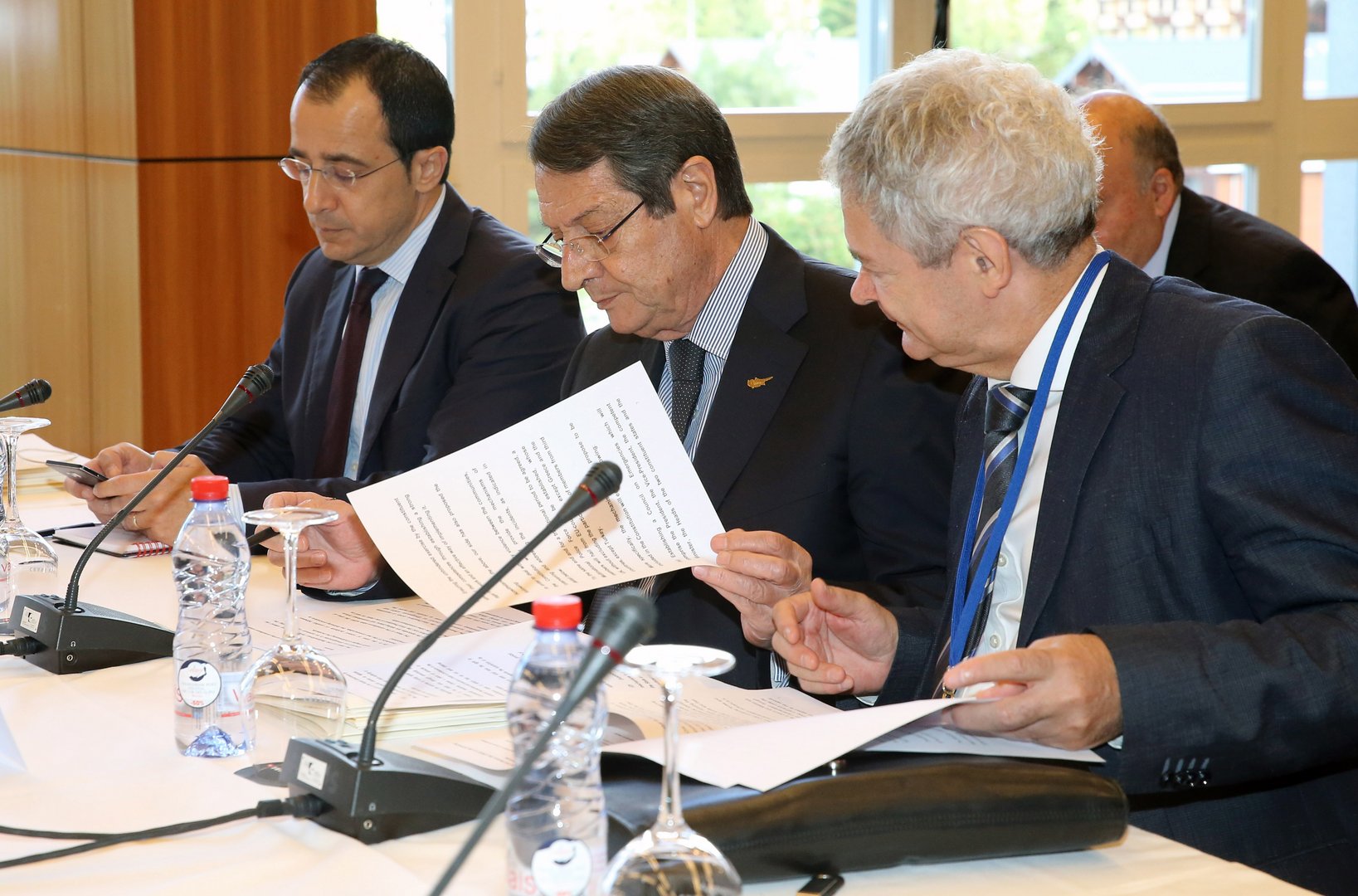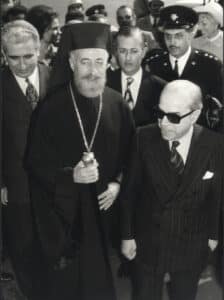Greek Cypriots were very unhappy with the reports on Cyprus by the UN Secretary-General released this week. Leontios Ierodiakonou explains why they are progressively becoming worse for the Greek Cypriots
With the passing of time, the reports on the Cyprus problem issued every six months by the UN Secretary General get worse for the Greek Cypriot side. It is obvious, in recent years, he has tended to blame both sides for the stalemate. This attitude of his is bound to provoke reactions of varying intensity in the Greek Cypriot political leadership. However unfair this attitude of the leadership of the international organisation may seem to us, it must be interpreted.
In the many years of internationalisation of our national problem we have committed unjustified mistakes. The most striking cases will be mentioned here.
Archbishop Makarios, for the three decades of his leadership of the Greek Cypriots, survived a large number of Greek prime ministers and governments. He failed to develop genuine and sincere relations with any prime minister or government. On the contrary, with all prime ministers and all governments relations were marked by suspicion and underhandedness. This leads us to an inevitable conclusion: given that none of the Greek prime ministers was convinced of his sincerity and trustworthiness, we can imagine how further downgraded his credibility was for other leaders.
After the Turkish invasion, the position of the G/C side was very weakened. Our main weapon was internationalisation. Instead of capitalising on international interest when the issue was pressing, immediately after the invasion, and seeking a nationally acceptable compromise, we adopted the long-term struggle, hoping for more maximalist results. The long term blatantly served Turkey’s interests. After completing their military plans with the second phase of the invasion, the Turks were looking for time to consolidate the fait accompli.
The long term would make sense if there was the prospect in the future of tipping the military balance in our favour. That prospect did not exist. That is why all the political forces (even those which thrive on rhetorical patriotism) rightly adopted the method of peace talks to solve the problem, that is, through internationalisation.
After Makarios, we had the 10-year presidency of Spyros Kyprianou, during which the American-British-Canadian Plan and a series of proposals promoted for ten years by the then UN Secretary General Perez de Cuellar were rejected. In fact, one of those plans, entitled ‘Agenda’, while accepted and praised in December 1984, was rejected a month later, without Kyprianou explaining the reasons for his change of mind. Rauf Denktash appeared to have accepted that plan, so the responsibility for its rejection was placed on the G/C side.
In April 1986, Kyprianou adopted the so-called “preface” which meant that the key issues of the problem were given priority over everything else. Therefore, he adopted more aggressive diplomacy. In a letter to the UNSG, “he called for the convening of an international conference on the international aspects of the Cyprus problem, namely: a) the withdrawal of Turkish occupation troops and settlers and b) effective international guarantees”. Is it possible that Kyprianou believed that any UN official or even a leader of a state with moderate international influence would be found to take these suggestions seriously?
Nicos Rolandis, who served Kyprianou’s foreign minister for five years, commenting on the impressions created by Kyprianou’s presidency in relation to the handling of the Cyprus problem, wrote: “In the (UN) General Secretariat there was a negativity about the Cyprus problem. Many officials had burnt their fingers in the past and any effort or initiative was viewed with suspicion.”
The third president who very seriously damaged our credibility and trustworthiness was Tassos Papadopoulos, particularly in the way he dealt with the Annan Plan.
The Annan Plan was combined with the process for accession to the EU. The Commissioner for Enlargement was Gunter Verhuegen, who was very supportive and helpful of this effort. Papadopoulos, for more than a year (he was elected in 2003), was positive and cooperative in promoting the Plan.
At the last moment, instead of presenting it to the people in a balanced and objective way, as President, he only emphasised the negative aspects and, with super-charged emotion, called on the people to vote against it. The bitterness with which Verheugen expressed himself, afterwards, reflected the total shattering of our credibility, not only in the UN but also in Brussels. In the European Parliament he stressed “I personally feel that I have been deceived by the Government of the Republic of Cyprus.” Referring to the behaviour of the President, he added: “While he used to say that he agreed with the general principles of the Plan and that he was only seeking minor improvements, he is now recommending its rejection.”
To suggestions of a serious blow to our credibility, Papadopoulos’ smart” response came with the question: “What? Will the waiters not serve me in Brussels now?”
The fourth president who has seriously damaged our credibility is Nicos Anastasiades, especially with his behaviour at the Crans Montana conference. The content of the proposal presented by the Secretary General on 30 June 2017, known as the “Guterres Framework”, was at first described by our delegation, from positive to very positive. Members of our delegation lavished praise on Antonio Guterres. After the failure of the conference, the then government spokesman Nikos Christodoulides thanked, on behalf of Anastasiades, “the UN Secretary General who, with his presence here and the way he approached the pending issues, demonstrated that he understands the principles that should govern a comprehensive solution to the Cyprus problem.”
It was also indicative of the fact that even after the failure of that conference, our official position was to resume the talks from where they left off in Crans Montana.
A year later, from his position as foreign minister, Christodoulides expressed satisfaction because it was the first time that issues of “security and guarantees were discussed and maps were exchanged on an agreed framework…”. He then referred to the UNSG envoy, Jane Holl Lute’s mission and wished: “that there will be such results that will help to start from where we left off in Crans Montana.”
Also, negotiator Andreas Mavroyiannis, while applauding the conduct of the UNSG in Crans Montana, concluded that “The SG has an understanding of the Cyprus problem more than the parties involved thought”. (12/8/2018)
On July 6, 2017, three hours before the last negotiation in Crans Montana, a meeting was held between the UN leadership and our delegation, which was attended by Guterres and his Special Representative Espen Barth Eide, Anastasiades, Mavroyiannis and Christodoulides.
When one studies the UN minutes of that meeting, one realises that our side was afraid of making progress in the negotiations. Certainly, with the burden of responsibility on the president, we were essentially questioning not only the conclusions of Guterres from his meetings with the Turkish delegation, but also his intentions. Our behaviour at the last working dinner, which followed, was also non-serious and unconstructive, leading to the collapse of the effort.
In November 2021, a series of UN minutes of the proceedings of that conference were made public. In the public debate that ensued, essentially all three members of our delegation took cover behind Turkish intransigence. To always put blame on the intransigence of the other side is very easy. But Turkey invaded and has illegally occupied more than 1/3 of our territory for almost half a century. Of course, it is and will continue to be intransigent. What should be judged is our own political behaviour.
Simply put, the president (who bears the main responsibility), the then government spokesman and the then negotiator were impressed by the clarity of the Secretary-General’s thinking on the Cyprus problem and the content of his framework. However, by their behaviour, not only did they fail to gain anything positive, they even failed to demonstrate Turkey’s intransigence. When the UN minutes began to be published in the Cypriot press, all three of them tried to convince us that the Turks were exclusively to blame for the collapse. I do not know how many of us they convinced, but it would have been much better if they had also convinced the UNSG and EU High Representative, Federica Mogherini, who was also present.
No matter how just our objectives are, when they are not achievable with the means at our disposal, they cause damage instead of benefit. Internationalisation can help to a certain extent – it can only lead to a compromise. It cannot offer immediate and complete liberation, which can only be achieved through military superiority or victorious war.
We must admit that internationalisation has offered us plans for compromise that would largely overturn the status quo. They provided for the return under G/C administration of territories that would allow for the resettlement, within tolerable time frames, of even the return of the vast majority of refugees to their homes and properties. At the same time, they also envisaged return of refugees under TC administration. At the same time, they provided for the gradual withdrawal of the occupying troops. If such compromises were accepted and implemented, they would open wider horizons and encourage further integration of the economy, culture, population and even the territory.
Unfortunately, with the rhetoric of patriotic extremism, in almost five decades not a single refugee has returned, not a single square metre of territory has been taken back and not a single Turkish soldier has been kicked out.
Unfortunately, our own behaviour over time, sometimes by recourse to nice-sound-sounding, unattainable goals, sometimes by party or personal calculations, sometimes by cowardice, sometimes by self-serving expediency of the political leadership, after almost half a century we have reached the point of sharing with the conqueror the responsibility for the non-solution.
With this behaviour, Turkey was left free to consolidate the faits accompli of the invasion, the most frightening being the alteration of the population and the Islamisation of the occupied part. In the process we have also wrecked our international credibility. In short, we have effectively killed our main, if not our only weapon, which is internationalisation.
After the elections, it is possible, if the person elected behaves responsibly and seriously, to help regain our shattered credibility. But if we do not get serious, neither the UN nor the EU, nor any state or states with international influence will help us.
One of the leading presidential candidates is avoiding revealing his positions, not only on the Cyprus problem, but also his broader commitments to the political parties that, after negotiating with him, decided to back him. He always responds to questions about his relationship with his backers with half-truths and evasions. He only concedes that there are some differences, but these bother no-one. He lets it be understood that all parties that support him are well-meaning and good. He concludes with the usual platitude, that, in the end, we will be judged by the people and society, to whom he is afraid to reveal his positions.
The same candidate, while in the past praising the UNSG and extolling the content of the Guterres framework, now says: If elected, I will re-negotiate it. This statement may satisfy some of the party leaders who support him. But it will certainly not convince the UNSG that this would help to create common ground for a new effort. Because the UNSG knows very well that the fruitless negotiations have been going on for 48 years.
Leontios Ierodiaconou, is a former Disy deputy and also served as minister of communications and works in the Clerides government. His last book, published last year, was Fatal Leadership (1948-2021): Makarios and his Continuers.









Click here to change your cookie preferences